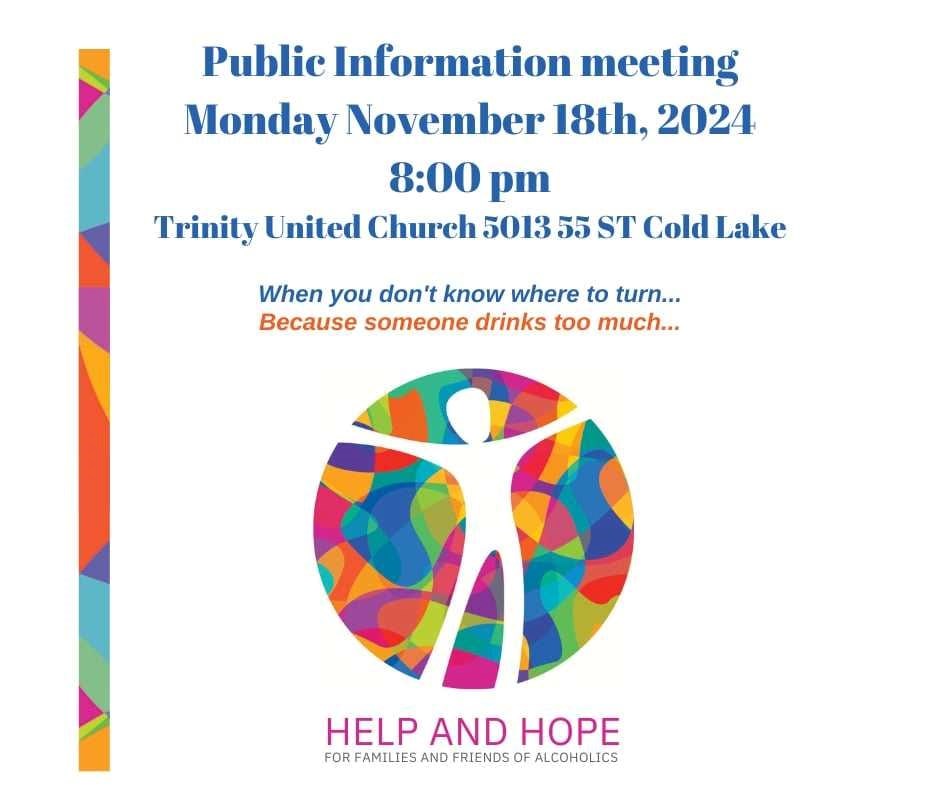COLD LAKE - An annual open meeting of Al-Anon and Alcoholics Anonymous (AA) was held at the Trinity United Church in Cold Lake on Nov. 18, inviting the public to learn more about how these programs support individuals and families affected by alcoholism.
The meeting provided personal testimonials, detailed insights into the groups’ purposes, and a deeper understanding of how alcoholism impacts not only the individual but also loved ones.
“It’s something that we’ve tried to do annually,” said Terri, a representative for both AA and Al-Anon in Cold Lake, highlighting the rotating leadership structure of their group. “We try to hold at least one public information meeting every year . . . to let people know what we do because there’s a lot of misconceptions about both AA and Al-Anon.”
Terri clarified a common misunderstanding about Al-Anon, stating, “A lot of people mistakenly think that Al-Anon is also for people that have addiction issues, but it’s actually for family members that have been affected by someone else’s drinking issues.”
She dispelled the myth that the program is strictly faith-based.
“It’s a spiritual program . . . about finding a higher power, something that you can release those negative feelings into.”
One attendee, who shared their experience anonymously, spoke about their journey of growing up in a chaotic household shaped by their mother’s alcoholism. They described the shame, isolation, and struggles that marked their early years.
“I thought that getting into drunken brawls at 3 a.m. and getting pulled out of bed in your pyjamas was just par for the course,” they said.
Reflecting on their childhood, they revealed how the stigma surrounding their mother’s behavior kept them from forming close friendships.
“I was discouraged oftentimes from having long-term relationships with friends for fear that they would discover what our home life was really like,” they explained.
Their story of resilience continued into adulthood, as they sought stability for their own family, while grappling with the challenges of caring for their mother. They credited Al-Anon with helping them break the cycle of dysfunction.
“After over a decade of being in this program, I have learned how to fix myself . . . and how to break the cycle and develop a healthy relationship with my kids and my husband.”
Both Al-Anon and AA emphasize confidentiality and trust.
“What happens here stays here,” Terri said.
The programs offer global consistency, with materials and practices shared across the world. Terri recently attended a district conference representing the Cold Lake group, where she noted, “We all work together to make a program that’s consistent around the world.”
Terri also highlighted the longterm benefits of Al-Anon for breaking generational cycles of addiction.
“Hurt people hurt people. And it’s breaking cycles . . . Because you’re more likely to develop a drinking problem yourself, or a drug problem yourself, if you’ve been exposed to alcoholism or addictions in your life.”
The Cold Lake Al-Anon and AA meetings are held every Monday night from 8 to 9 p.m. at the Trinity United Church, welcoming anyone who identifies as being troubled by someone else’s drinking.
“It doesn’t matter if it’s Christmas Day, New Year’s Day, there’s a snowstorm . . . somebody is here to open up these doors,” said Terri. “We're definitely a community. You can see that when you spend time here . . . We're family in this room. And it's a nice feeling.”
Terri also emphasized the value of ongoing support, stating, “Having a program where you can get support, learn life skills, and become a more empathetic community member . . . this is a living program that you need your whole life.”



